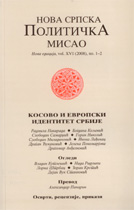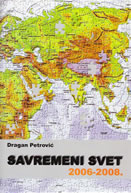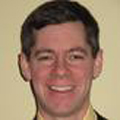| NSPM in English | |||
The End of Socialism |
 |
 |
 |
| уторак, 29. септембар 2009. | |
|
(The National Interest, 28.09. 2009)
Thus the election, widely touted as boring and uninteresting, proved to be anything but. The FDP, which espouses a classical liberal program of slashing taxes and curbing government regulation, was led to its smashing victory by its chairman, Guido Westerwelle. The real winner of the election is not Christian Democrat Angela Merkel, who will return as chancellor in a coalition government with the Free Democrats. Instead, it is Westerwelle, who is slated to become Germany’s new foreign minister. The election confirms a wider trend in Europe that Malte Lehming, an editor at the Berlin Tagespiegel, dubs “the end of socialism in Europe.” As Lehming notes, socialist parties have failed in France, Italy, Germany—and England is next. Meanwhile, Lehming tartly noted, Greece has a socialist government “and they’re rioting over there in the streets.” For Westerwelle, the election vindicates his strategy over the past eleven years to shun the Left and focus on an alliance with the conservative Christian Democrats. Westerwelle is young and dynamic, presenting himself as a kind of German Barack Obama. As a guest of the Friedrich Naumann Foundation, which organized a study group this week, I got a chance to see the rough-and-tumble of the election firsthand. On Thursday at the final election rally of the Free Democrats in Stuttgart, Westerwelle exuded confidence and gently mocked the leftists who were trying to disrupt his speech. The extent to which the Left remains a force in Germany is quite remarkable. Westerwelle announced that “we didn’t have unification in order to let the communists and socialists back into power.” I remarked to my friend Victorino Matus, an editor at the Weekly Standard who has followed German politics for many years, that it was remarkable that twenty years later, you could still run an election against communists. “Look around you,” he said. He was right. Protesters were waving red flags. One of the main forces crippling the Social Democrats is the rise of a party called “Die Linke,” or the “left party,” which is composed of former East German communists and hardcore leftists in East Germany. Led by Gregor Gysi, a former communist, and Oskar Lafontaine, the former head of the Social Democratic Party, the Left Party outpolled the Greens, capturing 12.4 percent of the vote. Some kind of fusion between the Left Party and Social Democrats will probably take place in a few years. But the Social Democrats, for now, will have to decide whether to go left or make a pitch for mainstream voters. Westerwelle made it abundantly clear that the Free Democrats represented the middle class and stability. He shrewdly ruled out an alliance with the Greens and Social Democrats a week before the election. At the election party at the Free Democratic Party headquarters on Sunday in Berlin, Alexander Lambsdorff—a member of the European parliament who was previously stationed in the German embassy in Washington and is a strong candidate to return to Berlin to become a top official in the foreign ministry—puckishly explained the election result this way: “liberals rescued conservatives.” By this he meant that the Christian Democratic Party would never have been able to retain power without the help of the liberals. The blunt fact is that under Merkel, who is a poor campaigner, the Christian Democrats have become what Germans called “social democratized.” The party’s economic policies are barely distinguishable from those of the Social Democrats. For Merkel working with the Free Democrats will prove much trickier than allying herself with the socialists. She has already indicated that she doesn’t want a full overhaul of the tax system and will be “chancellor of all Germans.” The Free Democrats, by contrast, must show results or their numbers will plunge in the next election. They reject further regulation of financial markets and want to lower taxes. It’s not that the Free Democrats want to gut the social-market model in Germany, but any reforms will trigger an outcry from a predominantly left-wing press and academics who love to depict the party as a redoubt of cold, ruthless free marketeers. Merkel will seek to position herself in the middle, as curbing the excesses of the Free Democrats. But with almost 15 percent of the vote, the Free Democrats will have a very strong hand and financial expert Hermann Otto Solms, a Free Democrat, will head the Finance Ministry. He has already developed a comprehensive plan for cutting the federal deficit and lowering taxes. In addition, Merkel may well face a revolt in her own ranks in a year or two. Her miserable performance has elicited grumbling in the ranks of her party, which has never been all that fond of her. Her detractors like to call her “Mutti,” or “mummy.” In standing for everything, they say, she stands for nothing. If the economic policy is due for some shakeups, foreign policy is not. 70 percent of Germany, polls regularly indicate, is opposed to the war in Afghanistan and would like to withdraw German forces. So far, only the Left Party has publicly endorsed withdrawal. Afghanistan was a taboo subject during the campaign, one that the major parties refused to discuss. With Westerwelle as foreign minister, Germany will continue to follow a pro-American course. Party spokesman Robert von Rimscha, who would also likely go into the foreign ministry, has written a book praising the American model. Had the Left triumphed in Germany, Obama would have been confronted with yet another foreign-policy dilemma in t he form of a possible German retreat from Afghanistan. For the Free Democrats celebrating at Unter den Linden, however, it was simply a time to celebrate. As the champagne flowed, the only downer note was sounded by three journalists from the hardcore nationalist weekly Junge Freiheit, or Young Freedom, who were catching a smoke in the tent right outside the main building. Young Freedom editor Matthias Baekermann and his chums were phlegmatic about the results. “Nothing will change,” one said. “Well, maybe a little in economic policy.” But it seems clear that as Germany prepares to commemorate the twentieth anniversary of the fall of the Berlin Wall on November 9, it has made another decisive break with socialism. (Jacob Heilbrunn is a senior editor at The National Interest) |
Од истог аутора
Остали чланци у рубрици
- Playing With Fire in Ukraine
- Kosovo as a res extra commercium and the alchemy of colonization
- The Balkans XX years after NATO aggression: the case of the Republic of Srpska – past, present and future
- Из архиве - Remarks Before the Foreign Affairs Committee of the European Parliament
- Dysfunction in the Balkans - Can the Post-Yugoslav Settlement Survive?
- Serbia’s latest would-be savior is a modernizer, a strongman - or both
- Why the Ukraine Crisis Is the West’s Fault
- The Ghosts of World War I Circle over Ukraine
- Nato's action plan in Ukraine is right out of Dr Strangelove
- Why Yanukovych Said No to Europe

.jpg)








 Is President Obama listening to the message of the German election? It couldn’t be clearer: no new taxes. Germany has decisively rejected the tired nostrums of the Social Democratic Party, which campaigned on raising taxes on the wealthy and was the junior partner of the Christian Democrats in a grand coalition during the past four years. The Social Democrats turned in their worst performance in the history of the Federal Republic, a mere 23 percent, while the Free Democratic Party (FDP) polled a record 14.6 percent. The Christian Democrats crawled across the finish line with 33.9 percent.
Is President Obama listening to the message of the German election? It couldn’t be clearer: no new taxes. Germany has decisively rejected the tired nostrums of the Social Democratic Party, which campaigned on raising taxes on the wealthy and was the junior partner of the Christian Democrats in a grand coalition during the past four years. The Social Democrats turned in their worst performance in the history of the Federal Republic, a mere 23 percent, while the Free Democratic Party (FDP) polled a record 14.6 percent. The Christian Democrats crawled across the finish line with 33.9 percent.













